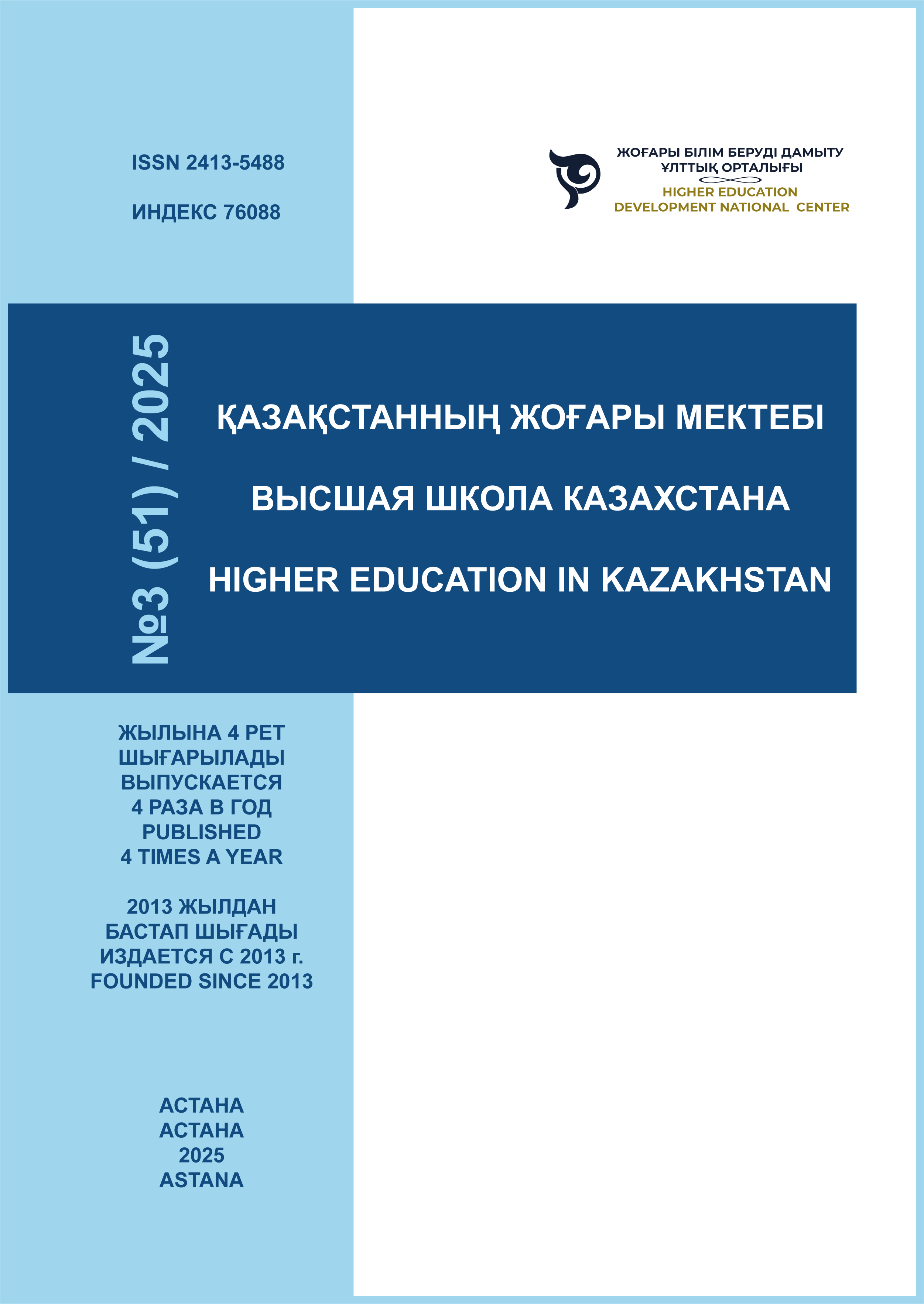INNOVATING CAREER SUPPORT IN HIGHER EDUCATION FOR PERSONALIZED PROFESSIONAL DEVELOPMNET
DOI:
https://doi.org/10.59787/2413-5488-2025-51-3-120-130Кілт сөздер:
higher education, professional development, career planning, soft skills, employability, global labor market, educational reform, competitiveness of graduatesАңдатпа
This article examines the current challenges and possibilities in preparing future professionals within higher education, paying particular attention to the changing educational environment of Kazakhstan. It argues that universities must align their curricula with the fast-shifting demands of the global labor market, where not only technical knowledge but also career planning and personal competencies are increasingly valued. The discussion highlights the growing significance of soft skills such as adaptability, problem-solving, and communication as key elements of employability, on par with academic training. Drawing on both national and international perspectives and informed by concepts of globalization and interconnected labor markets, the study compares how different systems approach career support. The analysis shows that while technical expertise remains necessary, modern employers often prioritize creativity, flexibility, and interpersonal strengths. By bringing together findings from pedagogical research and policy reports, the article stresses the need to embed career education and soft-skills development into university programs. It concludes that the professional success of graduates depends not only on specialized training but also on the systematic cultivation of transferable competencies, which together will help them stay resilient and competitive in an unpredictable global economy.
Әдебиеттер тізімі
Bakhtin, E. L. (2022). Rol’ vysshego obrazovaniya v formirovanii orientatsiy studentov i vypusknikov vuzov na prekar’nuyu zanyatost’ [The role of higher education in shaping the orientation of students and university graduates towards precarious employment] (Candidate of Sociology dissertation).
Bandura, A. (1986). Social foundations of thought and action: A social cognitive theory. Englewood Cliffs, NJ: Prentice Hall.
Bandura, A. (1997). Self-efficacy: The exercise of control. New York: Freeman.
Bandura, A. (2012). On the functional properties of perceived self-efficacy revisited. Journal of Management, 38(1), 9–44.
Boluchevskaya, V. V. (2010). Sotsialno-psikhologicheskie osobennosti professional'nogo samoopredeleniya budushchikh spetsialistov pomogayushchikh professiy [Socio-psychological characteristics of professional self-determination of future specialists in helping professions]. Volgograd: Izd-vo VolGMU.
Brown, S., & Lent, R. (2012). Career development and counseling: Putting theory and research to work (2nd ed.). Hoboken, NJ: Wiley & Sons.
Conklin, A. M., Dahling, J. J., & Garcia, P. A. (2013). Linking affective commitment, career self-efficacy, and outcome expectations: A test of social cognitive career theory. Journal of Career Development, 40(1), 68–83. https://doi.org/10.1177/0894845311414572
Deemer, E. D., Thoman, D. B., Chase, J. P., & Smith, J. L. (2014). Feeling the threat: Stereotype threat as a contextual barrier to women’s science career choice intentions. Journal of Career Development, 41(2), 141–158. https://doi.org/10.1177/0894845313483003
Fouad, N. A., Hackett, G., Smith, P. L., Kantamneni, N., Fitzpatrick, M., Haag, S., & Spencer, D. (2010). Barriers and supports for continuing in mathematics and science: Gender and educational level differences. Journal of Vocational Behavior, 77(3), 361–373. https://doi.org/10.1016/j.jvb.2010.06.004
Jiang, Z. (2016). Emotional intelligence and career decision‐making self‐efficacy: Mediating roles of goal commitment and professional commitment. Journal of Employment Counseling, 53(1), 30–47. https://doi.org/10.1002/joec.12026
Klyachko, T. L., & Tokareva, G. S. (2025). Otsenka izbytochnosti/nedostatochnosti kvalifikatsii molodezhi: zarubezhnyi opyt [Assessment of redundancy/deficiency of youth qualifications: Foreign experience]. Professional Education and Labor Market, 13(1), 49–74.
Krasil’nikova, M. M. (2024). Otnoshenie k obrazovatel’noi srede i akademicheskaia motivatsiia kak prediktory professional’nogo samoopredeleniia budushchikh pedagogov [Attitudes toward the educational environment and academic motivation as predictors of professional self-determination of future teachers] [Doctoral dissertation].
Le, T. D., Robinson, L. J., & Dobele, A. R. (2020). Understanding high school students’ use of choice factors and word-of-mouth information sources in university selection. Studies in Higher Education, 45(4), 808–818. https://doi.org/10.1080/03075079.2018.1564259
Lent, R. W., Brown, S. D., & Hackett, G. (2000). Contextual supports and barriers to career choice: A social cognitive analysis. Journal of Counseling Psychology, 47(1), 36–49. https://doi.org/10.1037/0022-0167.47.1.36
Lent, R. W., Miller, M. J., Smith, P. E., Watford, B. A., Hui, K., & Lim, R. H. (2015). Social cognitive model of adjustment to engineering majors: Longitudinal test across gender and race/ethnicity. Journal of Vocational Behavior, 86, 77–85. https://doi.org/10.1016/j.jvb.2014.11.004
Lin, Y., Liu, Z., Li, W., & Ma, H. (2016). Experience of dormitory peer mentors: A journey of self-learning and development. Education, 136(4), 437–450.
MacLeod, A., Burm, S., & Mann, K. (2022). Constructivism: Learning theories and approaches to research. In K. Mann, J. Gordon, & M. Dornan (Eds.), Researching medical education (pp. 25–40). Hoboken, NJ: Wiley.
Olson, J. S. (2014). Opportunities, obstacles, and options: First-generation college graduates and social cognitive career theory. Journal of Career Development, 41(3), 199–217. https://doi.org/10.1177/0894845313486352
Quinlan, K. M., & Renninger, K. A. (2022). Rethinking employability: How students build on interest in a subject to plan a career. Higher Education, 84(4), 863–883. https://doi.org/10.1007/s10734-021-00767-7
Rodionov, M. G., & Borisova, O. M. (2021). Teorii professional’nogo razvitiya i kar’ery v sovremennykh rynochnykh usloviyakh [Theories of professional development and careers in modern market conditions]. In Upravlenie sotsial’no-ekonomicheskimi sistemami v usloviyakh neopredelennosti (pp. 62–82).
Sampson, J. P., Hou, P. C., Kronholz, J. F., Dozier, V. C., McCain, M. C., & Buzzetta, M. (2014). A content analysis of career development theory, research, and practice–2013. The Career Development Quarterly, 62(4), 290–326. https://doi.org/10.1002/j.2161-0045.2014.00085.x
Sarkis-Onofre, R., et al. (2021). How to properly use the PRISMA Statement. Systematic Reviews, 10(117). https://doi.org/10.1186/s13643-021-01671-0
Thiem, K. C., & Dasgupta, N. (2022). From precollege to career: Barriers facing historically marginalized students and evidence‐based solutions. Social Issues and Policy Review, 16(1), 212–251. https://doi.org/10.1111/sipr.12083
Virtic, M. P., & Sorgo, A. (2022). Lower secondary school experiences as predictors of career aspirations toward engineering, and production and processing occupations. European Journal of Engineering Education, 47(5), 833–850. https://doi.org/10.1080/03043797.2022.2033169
Wang, D., Liu, X., & Deng, H. (2022). The perspectives of social cognitive career theory approach in current times. Frontiers in Psychology, 13, 1023994. https://doi.org/10.3389/fpsyg.2022.1023994
Yamani, N., & Almazroa, H. (2024). Exploring career interest and STEM self‐efficacy: Implications for promoting gender equity. Frontiers in Psychology, 15, 1402933. https://doi.org/10.3389/fpsyg.2024.1402933
Zhang, Y. (2024). Path of career planning and employment strategy based on deep learning in the information age. PLOS ONE, 19(10), e0308654. https://doi.org/10.1371/journal.pone.0308654

Жүктеулер
Жарияланды
Журналдың саны
Бөлім
Лицензия
Авторлық құқық (c) 2025 "Қазақстанның жоғары мектебі" ғылыми-сараптамалық журналы

Бұл жұмыс Creative Commons Attribution-Коммерциялық емес 4.0 халықаралық лицензиясы.













